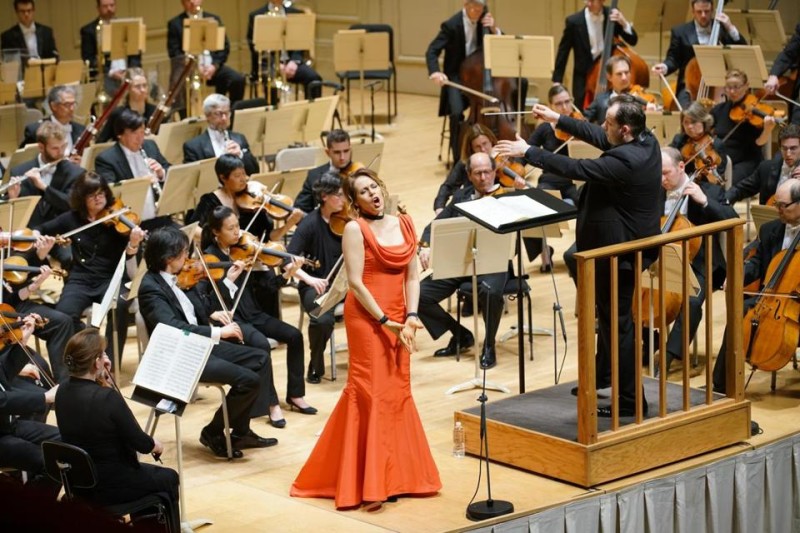| April 23, 2016


| April 23, 2016

“As if to underscore the institutional mood, Nelsons welcomed his wife, Kristine Opolais, back to the stage as vocal soloist with an orchestrated version of Rachmaninoff’s “Zdes’ khorosho” (“It is fine here”). This is a brief song beloved by sopranos for its winged melodies that telegraph a kind of poised satiation of the spirit . . . Thursday’s account hit its mark. And then Opolais quickly returned to the stage for a more substantive offering: the famed Letter Scene from Tchaikovsky’s opera “Eugene Onegin.”
Opolais was very much in her element here, her soprano radiant with dusky colorings, while dramatically, too, she inhabited the role of the young Tatiana coming to terms with the stirrings of her deep love for Onegin.”
Jeremy Eichler – Boston Globe
“Kristine Opolais entered in a drape-collared, salmon, mermaid gown to close the first half with two vocal selections: Rachmaninov’s song, Zdes’ khorosho (How fair this spot, orchestrated by Michael Rot), and the Letter Scene from Tchaikovsky’s Eugene Onegin. Clocking in at just 22 measures, the Rachmaninov is briefer than a mayfly’s lifespan. Yet it manages to sculpt an arc of rhapsodic revery which Opolais captured in what seemed like one, unbroken breath and capped with a high B taken pianissimo to end the song on a sigh of contentment.
Pushkin compares his 17 year-old Tatyana to a “wild, shy doe”. Tchaikovsky’s music for the Letter Scene capers and vaults accordingly, tracking the whipsawed emotions of his heroine as she endeavors to put into words her love for Onegin. By turns impetuous, hesitant, uncertain, and confident, Tatyana works herself into a frenzy fueled by the dreams and novels which have been her sole and constant companions from her earliest days. Opolais is no stranger to Tatyana. In fact, it was the role which first brought her and Nelsons together. She adeptly shifted gears vocally and dramatically throwing herself headlong into the emotional ebb and flow of Tatyana’s turbulent outpourings. As in the Rachmaninov, calibrated dynamics and word coloring – the use of chest voice on the word ukorom (scorn), for example – grounded her interpretation. The smoky timbre of her voice added an unaccustomed sultry sensuality.”
Kevin Wells – Bachtrack
“Following Métaboles, Opolais took the stage for a pair vocal compositions. The first, Rachmaninoff’s brief “Zdes’ khorosho” (“How fair this place”), allowed her to show off the velvety lyricism of her voice while the second, the Letter Scene from Tchaikovsky’s Eugene Onegin, offered more dramatic and musical substance . . .
The repertoire suited her well: Opolais has keen dramatic instincts and her Letter Scene ably captured (especially for a non-staged presentation of the scene) the conflicting emotions of the opera’s remarkable heroine, Tatiana. She also has a simply lovely voice, one that seemed particularly well-suited to both pieces she sang.”
Jonathan Blumhofer – The Arts Fuse
Image: Michael Blanchard
July 19, 2025
Andris Nelsons, conductor
September 14, 2025
Giancarlo Guerrero, conductor